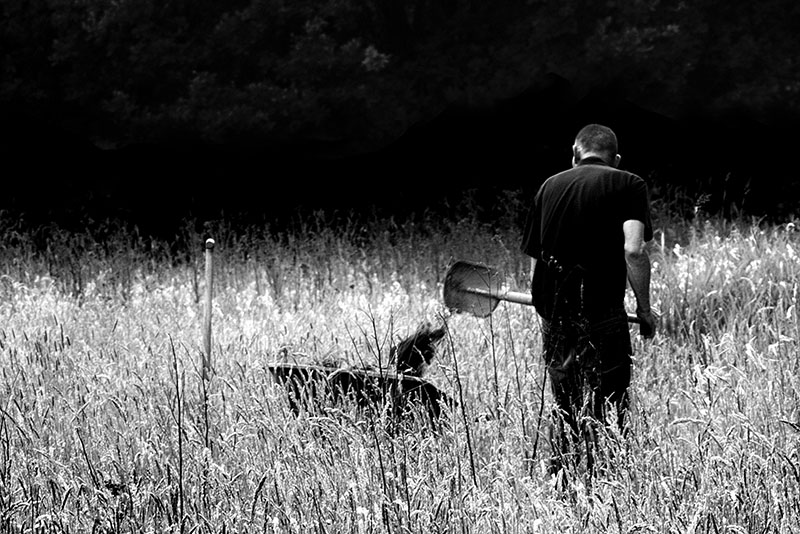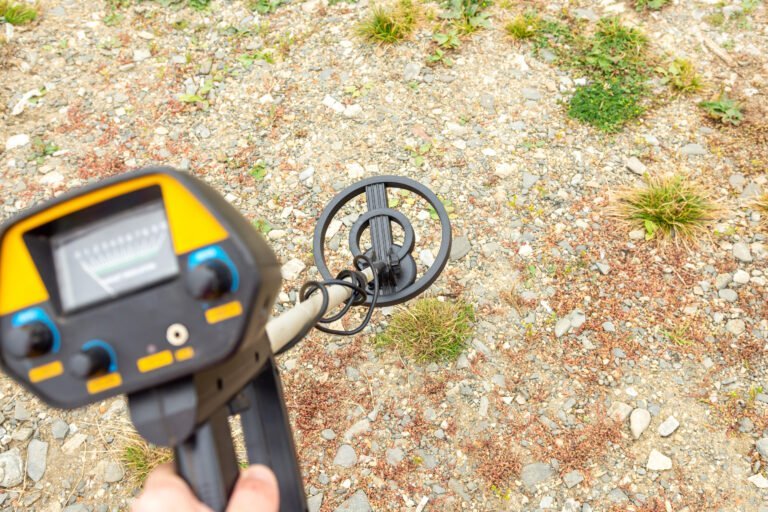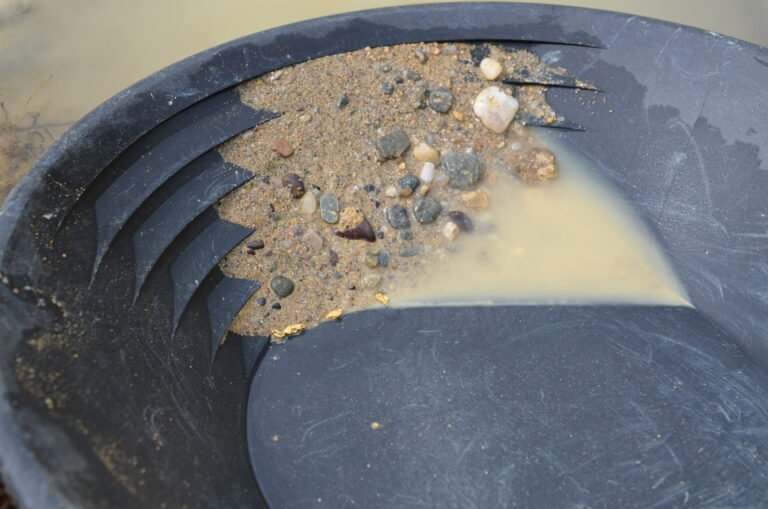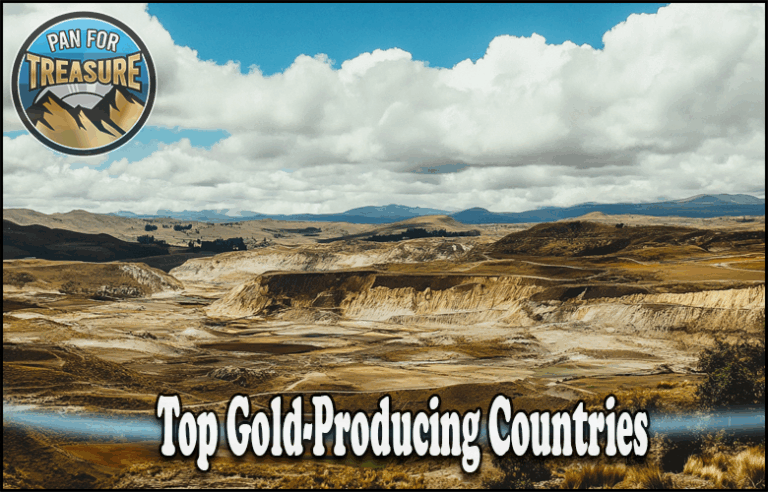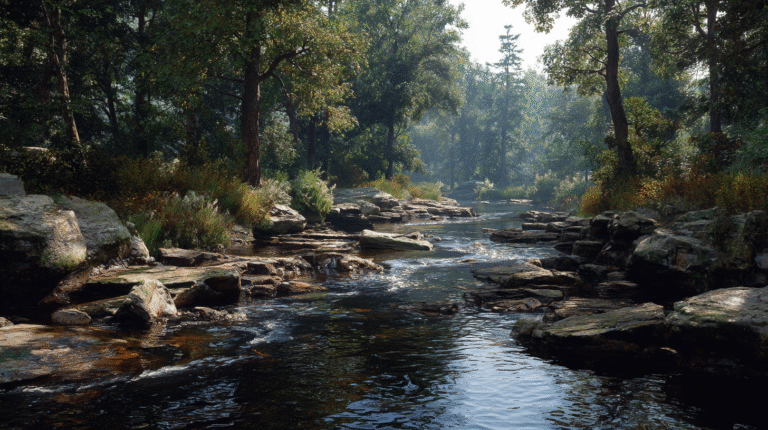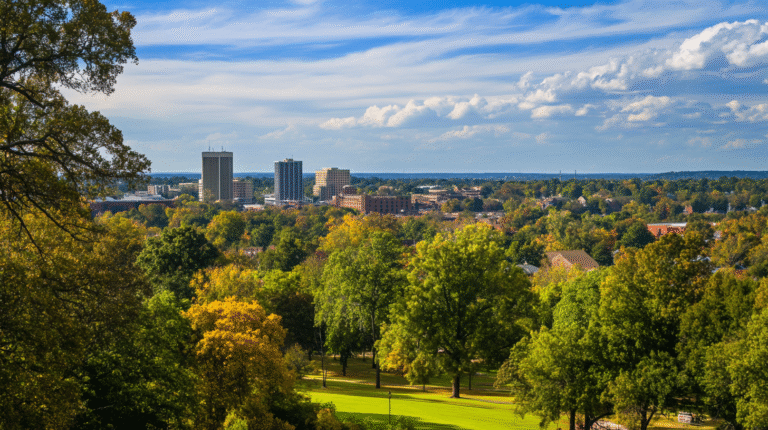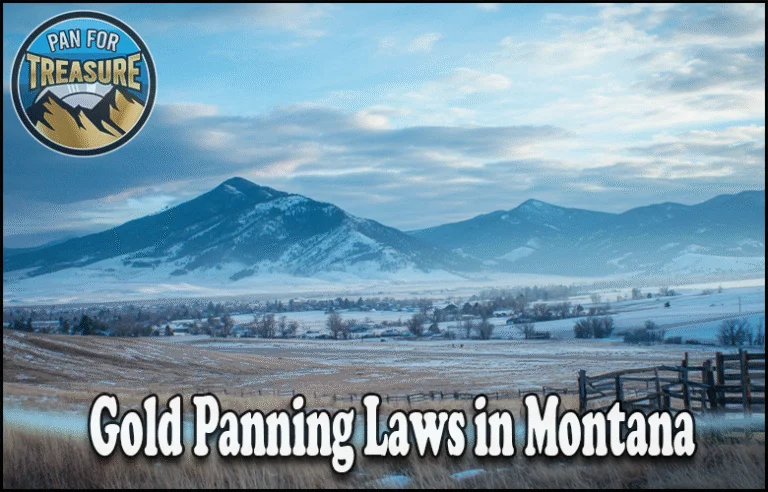Have you ever wondered if it’s possible to strike gold in your very own backyard?
First Posted December 15, 2024 | Last Updated on September 26, 2025 by Ryan ConlonDisclosure: This Post Contains Affiliate Links; We earn a commission on purchases.
The idea of discovering a valuable treasure right outside your door is undoubtedly enticing.
But is gold panning in your backyard a realistic possibility?
Let’s find out.
Gold panning in your backyard is indeed possible, although it’s important to note that it’s quite rare.
The likelihood of finding gold depends on various factors, including the location, soil or rock types present, and proximity to water sources.
It also requires a good knowledge base and effort to increase your chances of success in backyard gold panning.
While finding gold in your backyard may be uncommon, it is not impossible.
The possibility largely depends on the geological characteristics of your area.
Gold is often found in bedrocks or stream beds, making living near a river or lake advantageous.
It’s essential to have a good understanding of the soil and rock types in your backyard to increase your chances of finding gold.
To identify the presence of gold in your backyard, look out for visual indicators such as the presence of quartz, purple-red or yellow rocks, iron staining, and black or red soil.
These indicators can suggest the possibility of gold, as gold often mixes with other materials.
Observing traces of silver, copper, or iron can further indicate the presence of gold.
Certain soil types are commonly associated with gold deposits. Black sand soil, abundant in minerals and metals, is a positive indication.
Alluvial soil, found near riverbanks and lakes, is also known for its gold-rich deposits.
Understanding soil types and their relationship with minerals can provide valuable insights into the potential presence of gold in your backyard.
Similarly, certain rock formations are often associated with gold deposits.
Quartz rock is a prime example, as it commonly contains gold.
Igneous rocks and sedimentary rocks can also host gold deposits.
Familiarizing yourself with different rock types and their relationship with gold can help in identifying potential gold deposits in your backyard.
It’s crucial to maintain realistic expectations when it comes to finding gold in your backyard.
While living in areas with existing gold mines nearby or near riverbanks and lakes can increase your chances, significant finds are rare.
Keep in mind that backyard gold prospecting requires patience, knowledge, and a bit of luck.
When engaging in gold prospecting activities, it is important to be aware of the legal considerations.
Gold panning as a hobby is generally legal, but commercial ventures may have restrictions.
Understanding the laws and regulations regarding gold prospecting in your area, especially when prospecting on private property, is essential to ensure a legal and responsible experience.
In the unlikely event that you do find gold in your backyard, it’s crucial to determine ownership rights.
In most cases, mineral rights belong to the Crown or the Province, while buried gold such as coins or jewelry typically belongs to the rightful owner.
Consulting with a real estate lawyer can help you navigate the legal implications and ensure the appropriate course of action.
If you live in an area where mineral rights are owned by the Crown, it is possible for mining claims to be staked on private property.
This may require consulting with property owners and potential compensation for mining operations.
However, certain areas like townsites and registered residential subdivisions are typically exempt from mining claims.
In the event of mining-related damages to your property, you may be entitled to compensation.
Seeking legal advice and gathering evidence can help ensure fair compensation for any disturbances caused by mining operations.
Consulting a real estate lawyer is highly recommended when dealing with the legal implications of gold prospecting in your backyard.
They can provide guidance on mineral rights, mining claims, property ownership, and potential legal issues. Protecting your rights and ensuring legal compliance is paramount.
- Gold panning in your backyard is possible but rare.
- Familiarize yourself with the geological characteristics of your area to increase your chances of finding gold.
- Look for visual indicators like quartz, colored rocks, and specific soil types to identify the potential presence of gold.
- Understanding soil and rock types associated with gold deposits can help in identifying potential gold-rich areas.
- Maintain realistic expectations, as finding significant amounts of gold in your backyard is rare.
The Possibility of Finding Gold in Your Backyard
While it is not common, it is possible to find gold in your backyard. This depends on the soil and rock types in your area.
Gold is often found in bedrocks or stream beds, making living near a river or lake advantageous.
It is important to have a good understanding of the geological characteristics of your backyard to increase your chances of finding gold.
Exploring your backyard for potential gold deposits can be an exciting and rewarding venture.
However, it’s essential to manage your expectations and approach it with the right knowledge and techniques.
Gold prospecting in residential areas, also known as backyard mining or backyard gold panning, requires a basic understanding of the geological processes that can concentrate gold in certain areas.
To increase your chances of finding gold in your backyard, consider the following factors:
- Local geology: Research the geological history of your area. Learn about the rock formations, mineral deposits, and geological events that may have led to the presence of gold.
- Soil and sediments: Gold is often transported by erosion and deposited in soil or sediment layers. Understanding the soil composition and possible gold-bearing sediments in your backyard can guide your prospecting efforts.
- Hydrology: Proximity to water sources like rivers or lakes can increase the likelihood of finding gold. Water plays a crucial role in the movement and concentration of gold particles, especially in streambeds or riverbeds.
- Mineral indicators: Certain minerals, like quartz, can be associated with gold deposits. Identifying these mineral indicators can help narrow down potential gold-rich areas in your backyard.
- Historical information: Research local mining history or any reports of past gold discoveries in your region. Previous mining activities can indicate the potential presence of gold in nearby areas.
If you’re genuinely interested in backyard gold prospecting, it’s beneficial to equip yourself with proper tools and techniques.
These may include a gold pan, sluice box, or metal detector, depending on your preferred method.
Additionally, joining local gold prospecting clubs or connecting with experienced prospectors can provide invaluable guidance and support.
Remember, finding significant amounts of gold in your backyard is rare, but the joy of exploration and the thrill of discovering even small traces can make the experience worthwhile.
With patience, persistence, and a good understanding of the geological characteristics of your backyard, you may uncover your very own hidden treasure.
Tips for Identifying Gold in Your Backyard
To determine if there is gold in your backyard, keep an eye out for certain visual indicators.
These signs can help you identify the presence of gold and guide your prospecting efforts.
Look for:
- Quartz: Gold is often found in association with quartz. Keep an eye out for quartz veins or rocks that contain quartz. This mineral can be a good indicator that gold might be nearby.
- Purple-Red or Yellow Rocks: Certain rocks, such as hematite or pyrite, can have a purple-red or yellowish coloration, respectively. These rocks often contain traces of gold, making them worth investigating.
- Iron Staining: Gold is often found near iron-rich minerals. If you notice reddish-brown stains or rusty-looking rocks in your backyard, it could be a sign of iron, which can also indicate the presence of gold.
- Black or Red Soil: Gold has a tendency to mix with other materials like iron or magnetite, which can darken the soil. If you come across black or red soil in your backyard, it might be worth exploring further for potential gold deposits.
Additionally, keep an eye out for traces of other minerals that are commonly associated with gold, such as silver, copper, or iron.
These minerals can serve as additional indicators that gold may be present.
Remember, finding gold in your backyard is not a guarantee, but knowing these signs can increase your chances of discovering this precious metal.
It’s important to approach gold identification with a mix of curiosity and realistic expectations.
Soil Types Associated with Gold Deposits
Certain soil types are commonly associated with gold deposits.
Understanding these soil types can help you determine the potential presence of gold in your backyard.
The following soil types are often linked to gold-rich areas:
- Gold-rich soil: This type of soil contains a significant amount of gold particles and is a strong indicator that gold may be present in the area.
- Black sand soil: Black sand soil is abundant in minerals and metals, including gold. Its dark color comes from the presence of iron and other heavy minerals.
- Alluvial soil: Found near riverbanks and lakes, alluvial soil is known for its gold-rich deposits. It is formed by the deposition of sediment carried by flowing water.
By observing changes in soil color and understanding the relationship between soil and minerals, you can gain valuable insights into the likelihood of finding gold in your backyard.
Did You Know?
According to geologists, soil with a higher concentration of heavy minerals, such as black sand, is more likely to contain gold deposits.
If you’re unsure about the soil type in your backyard, consider reaching out to a local geologist or mineralogist for expert guidance.
Their knowledge and expertise can help you further in your quest to discover gold in your own backyard.
Rock Types Associated with Gold Deposits
When it comes to identifying potential gold deposits in your backyard, it’s important to understand the rock formations that are often associated with gold.
Certain rock types serve as indicators of gold-rich areas, helping you focus your prospecting efforts.
Let’s explore some of these rock types:
1. Quartz Rock
Quartz rock is a commonly found rock that often contains gold. It is characterized by its transparent or translucent appearance and is frequently associated with gold deposits. The presence of quartz rock can be a promising sign when searching for gold in your backyard.
2. Igneous Rocks
Igneous rocks, which are formed from the cooling and solidification of molten material, can also host gold deposits. Examples of igneous rocks include granite and basalt. Their unique composition and formation process can create favorable conditions for gold accumulation.
3. Sedimentary Rocks
Sedimentary rocks, such as sandstone and shale, can play a role in the formation of gold deposits as well. These rocks are formed by the accumulation of sediment over time and can contain trace amounts of gold. Paying attention to the presence of sedimentary rocks in your backyard can provide valuable clues in your search for gold.
By understanding the relationship between gold and different rock types, you can better identify potential gold deposits in your backyard.
Remember to conduct thorough research and consult with experts in geology and mineral identification to increase your chances of success.
| Rock Type | Description |
|---|---|
| Quartz Rock | Transparent or translucent rock commonly associated with gold deposits |
| Igneous Rocks | Rocks formed from the cooling and solidification of molten material; can host gold deposits |
| Sedimentary Rocks | Rocks formed by the accumulation of sediment over time; can contain trace amounts of gold |
Likelihood of Finding Gold in Your Backyard
While finding gold in a backyard is not very likely, the chances may increase depending on your location.
Areas with gold mines nearby, such as Alaska or California, have a higher likelihood of containing gold. Living near a river or lake can also increase your chances.
However, it is important to have realistic expectations, as finding significant amounts of gold in a backyard is rare.
If you’re interested in backyard gold prospecting, it’s essential to understand that it’s a hobby that often yields small amounts of gold.
It can be an enjoyable activity, providing a sense of adventure and the opportunity to connect with nature.
However, it’s crucial to manage expectations and be aware that backyard gold prospecting is unlikely to result in substantial financial gain.
That being said, if you live in an area with a history of gold mining or known gold deposits, the chances of finding gold in your backyard may be slightly higher.
These areas typically have geological characteristics that make gold deposits more likely to exist. Proximity to rivers, streams, or old mining sites can also increase the chances of finding gold.
However, it’s important to note that even in areas with a higher likelihood of gold, finding significant quantities in a residential backyard is still rare.
Most gold deposits are found in specific geological formations and require extensive exploration and mining operations to extract commercially viable amounts.
In summary, while the chances of finding gold in your backyard are slim, it can still be an exciting and rewarding hobby.
Enjoy the process of backyard gold prospecting, but don’t count on it as a reliable source of income.
Legal Considerations for Gold Prospecting in Your Backyard
When it comes to pursuing the exciting hobby of gold prospecting in your own backyard, there are important legal considerations to keep in mind.
While gold panning as a recreational activity is generally legal, it’s crucial to understand the specific laws and regulations that govern gold prospecting in your area.
Commercial gold mining ventures may have additional restrictions, such as permits, licenses, or environmental regulations that need to be followed.
This section will focus on the legal aspects of backyard gold prospecting for hobbyists.
First and foremost, it’s essential to research and familiarize yourself with the laws and regulations on gold panning in your locality.
Laws can vary from state to state, and even within different jurisdictions within the same state.
By understanding the rules, you can ensure that your activities are compliant and avoid any potential legal trouble.
One important consideration when prospecting for gold in your backyard is whether you are on private property.
If so, obtaining permission from the property owner is crucial.
While some areas may have public lands where gold prospecting is allowed, prospecting on private property without proper authorization is illegal and can result in legal repercussions.
It’s important to approach gold prospecting with responsibility and respect for both the environment and property rights.
Always ensure that you have the necessary permissions before engaging in any prospecting activities on private property.
“When prospecting on private property, permission from the property owner is required.”
By being aware of the legal considerations associated with backyard gold prospecting, you can enjoy your hobby while staying within the boundaries of the law.
Remember, being responsible and legally compliant ensures the preservation of both personal and environmental integrity.
Common Gold Panning Laws and Regulations
| Laws and Regulations | Description |
|---|---|
| Public Lands | Some areas may have public lands where gold prospecting is allowed with certain restrictions. |
| Private Property | Permission from the property owner is required before conducting any gold prospecting activities on private property. |
| Permits and Licenses | Commercial gold mining ventures often require permits and licenses to ensure compliance with environmental regulations. |
| Environmental Regulations | There may be specific regulations in place regarding the use of equipment, the impact on surrounding ecosystems, and the disposal of waste materials. |
| Heritage Sites | Some areas, particularly those with historical or cultural significance, may have restrictions to protect these sites from disruption. |
It is crucial to consult the appropriate authorities or conduct thorough research to ensure compliance with all relevant laws and regulations specific to your area before engaging in gold prospecting.
What to Do if You Find Gold in Your Backyard
If you find gold in your backyard, the first step is to determine ownership rights. In most cases, mineral rights belong to the Crown or the Province.
Buried gold, such as coins or jewelry, typically belongs to the rightful owner.
It is important to consult with a real estate lawyer to understand the legal implications of finding gold in your backyard and to determine the appropriate course of action.
Potential Mining Claims on Your Property
If you’re considering gold prospecting on your property, it’s essential to understand the potential mining claims that may exist.
Mining claims allow individuals or companies to stake a legal right to mine for minerals, including gold, on a specific piece of land.
This includes private property, provided that the mineral rights are owned by the Crown.
Consulting a real estate lawyer is advisable to determine the ownership of mineral rights and the potential for mining operations on your property.
It’s crucial to understand that property owners may need to be consulted and compensation may be required if mining activities are pursued.
By gaining clarity on the potential mining claims on your property, you can protect your rights as a homeowner.
While mining claims on private property are possible, it’s important to note that certain areas, such as townsites and registered residential subdivisions, are typically exempt from mining claims.
These exemptions ensure the protection of homeowners’ rights and prevent disruption within established communities.
Mining Claim Exemptions
Here is an overview of areas that are commonly exempt from mining claims:
- Townsites
- Registered residential subdivisions
| Exemption | Description |
|---|---|
| Townsites | Areas that have been officially designated as towns or cities, typically encompassing residential, commercial, and public spaces. |
| Registered Residential Subdivisions | Developments where properties have been legally divided into lots, usually characterized by residential dwellings and associated amenities. |
Understanding the potential mining claims on your property is essential for protecting your rights as a homeowner and ensuring a harmonious coexistence between mining activities and established communities.
By consulting a real estate lawyer, you can navigate the legal complexities surrounding mineral rights and mining operations, ensuring compliance with relevant laws and regulations.
Compensation for Mining Damages
Mining operations can have significant impacts on properties, causing physical disturbances and other damages.
Property owners who experience these damages may be entitled to compensation for the harm caused by mining activities.
Compensation can help address losses such as rental income and provide a means to restore the property to its pre-mining condition.
When it comes to compensation for mining damages, property rights play a crucial role.
Property owners have the right to determine which trees are cut down, ensuring the preservation of their land’s natural beauty.
Additionally, compensation can cover the costs of repairing any infrastructure or structures affected by mining operations.
Gathering evidence is crucial when seeking compensation for mining damages.
Property owners should document the extent of the damages, including photographs, videos, and any other relevant information.
This evidence will play a vital role in negotiations and legal proceedings.
It’s important for property owners to seek legal advice to ensure they are treated fairly throughout the compensation process.
A real estate lawyer specializing in mining-related cases can provide guidance and advocate for the property owner’s rights.
They can help navigate complex legalities and negotiate appropriate compensation terms.
“Mining damages can have a significant impact on property owners. Seeking fair compensation is not only a matter of protecting your property rights, but also ensuring the well-being of your investment.” – Mining Legal Expert
By understanding their property rights and seeking legal guidance, property owners can ensure they receive fair compensation for any damages caused by mining activities.
| Benefits of Seeking Compensation for Mining Damages | Considerations for Property Owners |
|---|---|
| 1. Financial compensation for rental income losses | 1. Document and gather evidence of damages |
| 2. Restoration of the property to its pre-mining condition | 2. Seek legal advice from a real estate lawyer |
| 3. Ability to determine which trees are cut down | 3. Understand property rights and compensation entitlements |
Consulting a Real Estate Lawyer
When it comes to the legal implications of gold prospecting in your backyard, seeking advice from a real estate lawyer is crucial.
A knowledgeable lawyer can provide valuable guidance and ensure that you have a thorough understanding of your property rights, mineral rights, and any potential legal issues that may arise.
Their expertise will help you navigate the complexities of gold prospecting and protect your interests.
Here are some of the reasons why consulting a real estate lawyer is essential:
Understanding Property Rights
A real estate lawyer can help you understand the ownership rights associated with your property.
They will guide you through the legal intricacies of gold prospecting on both privately-owned and Crown-owned land.
This will ensure that you are aware of any restrictions or permissions required for your gold prospecting activities.
Expertise on Mining Claims
With their in-depth knowledge of mining laws and regulations, a real estate lawyer can assist you in determining the potential mining claims on your property.
They will guide you through the process of identifying if the mineral rights belong to the Crown and help you understand the implications of these claims on your rights as a homeowner.
Legal Advice on Compliance
A real estate lawyer can provide you with legal advice on how to comply with the relevant laws and regulations related to gold prospecting.
They will ensure that you conduct your activities within the boundaries of the law, minimizing the risk of facing legal consequences or disputes in the future.
Protection of Your Rights
By consulting a real estate lawyer, you can ensure that your rights as a property owner are protected throughout the gold prospecting process.
They will help you understand the legal implications of any gold findings in your backyard and guide you on the appropriate actions to take to safeguard your interests.
“A real estate lawyer can provide you with the legal expertise necessary to navigate the complexities of gold prospecting and protect your property rights.”
Remember, each situation is unique, and consulting a real estate lawyer will provide you with tailored legal advice based on your specific circumstances.
By seeking professional guidance, you can have peace of mind knowing that you are making informed decisions and adhering to the law.
| Benefits of Consulting a Real Estate Lawyer |
|---|
| Expertise in property rights and mining laws |
| Legal guidance on compliance with gold prospecting regulations |
| Protection of your rights as a property owner |
| Customized advice based on your specific situation |
FAQ
Q: Can I pan for gold in my backyard?
A: While it is possible to find gold in your backyard, it is uncommon and requires a good understanding of geology, mineral identification, and the specific characteristics of your area. Maintaining realistic expectations and seeking legal advice when necessary can help ensure a responsible and enjoyable gold prospecting experience.
Q: What is the possibility of finding gold in my backyard?
A: The chances of finding gold in your backyard depend on the location, soil or rock types, and proximity to water sources. Living near a lake or river can increase your chances of finding gold. However, it requires effort and a good knowledge base to be successful in backyard gold panning.
Q: What are some tips for identifying gold in my backyard?
A: To identify the presence of gold in your backyard, look for visual indicators such as the presence of quartz, purple-red or yellow rocks, iron staining, and black or red soil. Gold often mixes with other materials, so finding these indicators can suggest the possibility of gold. Additionally, observing traces of silver, copper, or iron can further indicate the presence of gold.
Q: What are the soil types associated with gold deposits?
A: Certain soil types are commonly associated with gold deposits. Black sand soil, which is abundant in minerals and metals, is a good indicator. Alluvial soil, found near riverbanks and lakes, is also known for its gold-rich deposits. Observing changes in soil color and understanding the relationship between soil and minerals can provide valuable insights into the potential presence of gold in your backyard.
Q: What are the rock types associated with gold deposits?
A: Certain rock formations are often associated with gold deposits. Quartz rock is a good example, as it commonly contains gold. Igneous rocks and sedimentary rocks can also host gold deposits. Understanding the relationship between gold and different rock types can help in identifying potential gold deposits in your backyard.
Q: How likely am I to find gold in my backyard?
A: While finding gold in a backyard is not very likely, the chances may increase depending on your location. Areas with gold mines nearby, such as Alaska or California, have a higher likelihood of containing gold. Living near a river or lake can also increase your chances. However, it is important to have realistic expectations, as finding significant amounts of gold in a backyard is rare.
Q: What are the legal considerations for gold prospecting in my backyard?
A: Gold panning as a hobby is generally legal, but commercial ventures may have restrictions. It is important to research and understand the specific laws and regulations regarding gold prospecting in your area. When prospecting on private property, permission from the property owner is required. Being aware of the legal considerations can help ensure a legal and responsible gold prospecting experience.
Q: What should I do if I find gold in my backyard?
A: If you find gold in your backyard, the first step is to determine ownership rights. In most cases, mineral rights belong to the Crown or the Province. Buried gold, such as coins or jewelry, typically belongs to the rightful owner. It is important to consult with a real estate lawyer to understand the legal implications of finding gold in your backyard and to determine the appropriate course of action.
Q: Can mining claims be staked on my private property?
A: Mining claims can be staked on private property if the mineral rights are owned by the Crown. Property owners may need to be consulted, and compensation may be required if mining operations are pursued. However, there are areas, such as townsites and registered residential subdivisions, that are typically exempt from mining claims. Understanding the potential mining claims on your property can help protect your rights as a homeowner.
Q: Can I get compensation for damages caused by mining operations?
A: Mining operations can cause physical disturbances and other damages to properties. Property owners may be entitled to compensation for these damages, including rental income losses and the right to decide which trees are cut down. Gathering evidence and seeking legal advice can help ensure fair compensation for any mining-related damages.
Q: Should I consult a real estate lawyer regarding gold prospecting in my backyard?
A: When dealing with the legal implications of gold prospecting in your backyard, it is advisable to consult a real estate lawyer.
A lawyer can provide guidance on mineral rights, mining claims, property ownership, and potential legal issues. They can help protect your rights and ensure compliance with relevant laws and regulations.
Conclusion
In conclusion, while it is possible to find gold in your backyard, it is important to maintain realistic expectations and have a good understanding of the geology and mineral identification in your area.
Backyard gold panning requires knowledge and effort, as well as seeking legal advice when necessary to ensure a responsible and enjoyable prospecting experience.
Remember, finding significant amounts of gold in a residential area is rare, but the chances may increase if you live near a river or lake, or in regions with gold mining history.
However, it is crucial to respect the laws and regulations regarding gold prospecting, especially when it comes to private property.
With a realistic perspective, proper knowledge, and legal compliance, backyard gold panning can be an intriguing and enjoyable hobby.
If you’re interested in pursuing this activity, seek advice from a real estate lawyer to understand your rights and obligations.
References
- https://www.aarp.org/money/budgeting-saving/info-2023/how-to-pan-for-gold.html
- https://howtofindrocks.com/how-to-find-gold-in-your-backyard/
- https://www.axesslaw.com/articles/finding-gold-in-your-own-backyard/

Meet Ryan Conlon, the passionate owner and driving force behind Pan for Treasure.
With an unwavering love for the art of gold panning, Ryan has transformed his enthusiasm into a thriving community hub for fellow treasure seekers. info@panfortreasure.com
A seasoned gold panning enthusiast, Ryan’s journey began with a simple pan and a dream, evolving into a deep appreciation for the history, geology, and thrill of uncovering precious metals.
Subscribe to Our Newsletter

